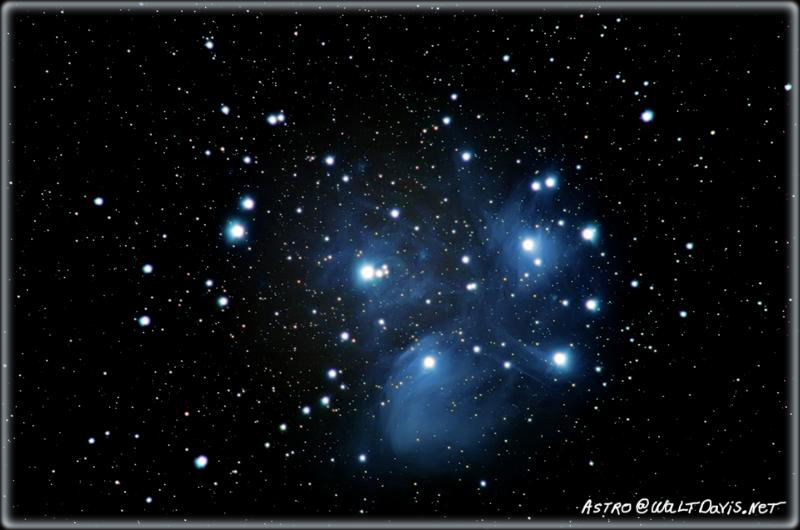|
 |
 |
|
|
|
Object Information
|
Name: |
M45, The Pleiades, or Seven Sisters |
|
Type: |
Star Cluster with Nebulosity. |
|
Description: |
M45 (the Pleiades) is a very bright star cluster that can be seen easily by the human eye as a
bright patch in the sky. Its beautiful to look at with binoculars and is a
winter time favorite. This picture was taken with a Nikon D70 and a 600mm f4
ED lens. |
|
Magnitude: |
1.2 |
|
Size: |
100.0 x 100.0 arcminutes |
|
Related Photos: |
none |
|
References: |
|
|
| Acquisition
|
Location: |
Latitude 44.841N by
Longitude -122.869W at an elevation of 87 meters.
Aumsville, Oregon USA |
|
Date: |
September 12, 2008 |
|
Zone: |
-8 (Pacific Standard Time) |
|
Equipment
|
Imager: |
Nikon D70 |
|
OTA: |
Nikkor 600mm f4 ED super telephoto lens |
|
Barlow: |
none |
|
Platform: |
2X Super Modified Nikon Imaging Platform |
|
Guiding: |
Orion StarShoot DSCI II, Nikkor 300mm f2.8 ED lens, and MaxIm DL Essentials. |
|
Imaging
|
Mode: |
Mode 2 |
|
White Balance: |
Sunlight |
|
Color
Space: |
sRGB |
|
Format: |
RAW (3008 x 2000) |
|
Light
frames: |
8 x (5 Min @ ISO 200) |
|
Darks: |
none |
|
Flats: |
none |
|
Filters: |
Nikon 39mm UV/IR |
|
Mask: |
none |
|
f-stops: |
f4 |
|
FOV: |
136 x 89 arcminutes |
|
Scale: |
2.71 arcseconds per pixel |
|
Software: |
Nikon Capture 4 Control |
|
Image Processing
|
Stacking: |
Deep Sky Stacker 3.2.1 |
|
Combined: |
Average |
|
Processing: |
PhotoShop CS3, Astronomy Tools CS2 V1.5, New Astro Zone System, Noiseware Professional Plugin. |
|
Notes
-
Stars away from the optical axis show significant flare.
-
While the Nikon 600mm ED Lens is a high quality lens; all lenses of this
size are have aberrations like this especially when at full aperture.
-
One way of removing aberrations is to stop the lens down at least by two
steps; however, on bright stars this will produce very large refraction
spikes.
|
|
|
 |

